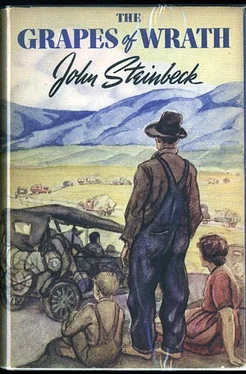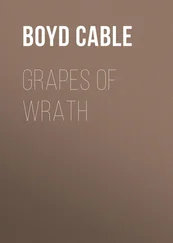John Steinbeck - The Grapes of Wrath
Здесь есть возможность читать онлайн «John Steinbeck - The Grapes of Wrath» весь текст электронной книги совершенно бесплатно (целиком полную версию без сокращений). В некоторых случаях можно слушать аудио, скачать через торрент в формате fb2 и присутствует краткое содержание. Город: New York, Год выпуска: 1939, Издательство: The Viking Press-James Lloyd, Жанр: Классическая проза, на английском языке. Описание произведения, (предисловие) а так же отзывы посетителей доступны на портале библиотеки ЛибКат.
- Название:The Grapes of Wrath
- Автор:
- Издательство:The Viking Press-James Lloyd
- Жанр:
- Год:1939
- Город:New York
- ISBN:нет данных
- Рейтинг книги:5 / 5. Голосов: 1
-
Избранное:Добавить в избранное
- Отзывы:
-
Ваша оценка:
- 100
- 1
- 2
- 3
- 4
- 5
The Grapes of Wrath: краткое содержание, описание и аннотация
Предлагаем к чтению аннотацию, описание, краткое содержание или предисловие (зависит от того, что написал сам автор книги «The Grapes of Wrath»). Если вы не нашли необходимую информацию о книге — напишите в комментариях, мы постараемся отыскать её.
The Grapes of Wrath — читать онлайн бесплатно полную книгу (весь текст) целиком
Ниже представлен текст книги, разбитый по страницам. Система сохранения места последней прочитанной страницы, позволяет с удобством читать онлайн бесплатно книгу «The Grapes of Wrath», без необходимости каждый раз заново искать на чём Вы остановились. Поставьте закладку, и сможете в любой момент перейти на страницу, на которой закончили чтение.
Интервал:
Закладка:
And the mice moved in and stored weed seeds in corners, in boxes, in the backs of drawers in the kitchens. And weasels came in to hunt the mice, and the brown owls flew shrieking in and out again.
Now there came a little shower. The weeds sprang up in front of the doorstep, where they had not been allowed, and grass grew up through the porch boards. The houses were vacant, and a vacant house falls quickly apart. Splits started up the sheathing from the rusted nails. A dust settled on the floors, and only mouse and weasel and cat tracks disturbed it.
One night the wind loosened a shingle and flipped it to the ground. The next wind pried into the hole where the shingle had been, lifted off three, and the next, a dozen. The midday sun burned through the hole and threw a glaring spot on the floor. The wild cats crept in from the fields at night, but they did not mew at the doorstep any more. They moved like shadows of a cloud across the room, into the rooms to hunt the mice. And on windy nights the doors banged, and the ragged curtains fluttered in the broken windows.
CHAPTER 12
HIGHWAY 66 IS THE main migrant road. 66—the long concrete path across the country, waving gently up and down on the map, from the Mississippi to Bakersfield—over the red lands and the gray lands, twisting up into the mountains, crossing the Divide and down into the bright and terrible desert, and across the desert to the mountains again, and into the rich California valleys.
66 is the path of a people in flight, refugees from dust and shrinking land, from the thunder of tractors and shrinking ownership, from the desert’s slow northward invasion, from the twisting winds that howl up out of Texas, from the floods that bring no richness to the land and steal what little richness is there. From all of these the people are in flight, and they come into 66 from the tributary side roads, from the wagon tracks and the rutted country roads. 66 is the mother road, the road of flight.
Clarksville and Ozark and Van Buren and Fort Smith on 64, and there’s an end of Arkansas. And all the roads into Oklahoma City, 66 down from Tulsa, 270 up from McAlester. 81 from Wichita Falls south, from Enid north. Edmond, McLoud, Purcell. 66 out of Oklahoma City; El Reno and Clinton, going west on 66. Hydro, Elk City, and Texola; and there’s an end to Oklahoma. 66 across the Panhandle of Texas. Shamrock and McLean, Conway and Amarillo, the yellow. Wildorado and Vega and Boise, and there’s an end of Texas. Tucumcari and Santa Rosa and into the New Mexican mountains to Albuquerque, where the road comes down from Santa Fe. Then down the gorged Rio Grande to Las Lunas and west again on 66 to Gallup, and there’s the border of New Mexico.
And now the high mountains. Holbrook and Winslow and Flagstaff in the high mountains of Arizona. Then the great plateau rolling like a ground swell. Ashfork and Kingman and stone mountains again, where water must be hauled and sold. Then out of the broken sun-rotted mountains of Arizona to the Colorado, with green reeds on its banks, and that’s the end of Arizona. There’s California just over the river, and a pretty town to start it. Needles, on the river. But the river is a stranger in this place. Up from Needles and over a burned range, and there’s the desert. And 66 goes on over the terrible desert, where the distance shimmers and the black center mountains hang unbearably in the distance. At last there’s Barstow, and more desert until at last the mountains rise up again, the good mountains, and 66 winds through them. Then suddenly a pass, and below the beautiful valley, below orchards and vineyards and little houses, and in the distance a city. And, oh, my God, it’s over.
The people in flight streamed out on 66, sometimes a single car, sometimes a little caravan. All day they rolled slowly along the road, and at night they stopped near water. In the day ancient leaky radiators sent up columns of steam, loose connecting rods hammered and pounded. And the men driving the trucks and the overloaded cars listened apprehensively. How far between towns? It is a terror between towns. If something breaks—well, if something breaks we camp right here while Jim walks to town and gets a part and walks back and—how much food we got?
Listen to the motor. Listen to the wheels. Listen with your ears and with your hands on the steering wheel; listen with the palm of your hand on the gear-shift lever; listen with your feet on the floor boards. Listen to the pounding old jalopy with all your senses, for a change of tone, a variation of rhythm may mean—a week here? That rattle—that’s tappets. Don’t hurt a bit. Tappets can rattle till Jesus comes again without no harm. But that thudding as the car moves along—can’t hear that—just kind of feel it. Maybe oil isn’t gettin’ someplace. Maybe a bearin’s startin’ to go. Jesus, if it’s a bearing, what’ll we do? Money’s goin’ fast.
And why’s the son-of-a-bitch heat up so hot today? This ain’t no climb. Le’s look. God Almighty, the fan belt’s gone! Here, make a belt outa this little piece a rope. Le’s see how long—there. I’ll splice the ends. Now take her slow—slow, till we can get to a town. That rope belt won’t last long.
’F we can on’y get to California where the oranges grow before this here ol’ jug blows up. ’F we on’y can.
And the tires—two layers of fabric worn through. On’y a four-ply tire. Might get a hundred miles more outa her if we don’t hit a rock an’ blow her. Which’ll we take—a hunderd, maybe, miles, or maybe spoil the tubes? Which? A hunderd miles. Well, that’s somepin you got to think about. We got tube patches. Maybe when she goes she’ll only spring a leak. How about makin’ a boot? Might get five hunderd more miles. Le’s go on till she blows.
We got to get a tire, but, Jesus, they want a lot for a ol’ tire. They look a fella over. They know he got to go on. They know he can’t wait. And the price goes up.
Take it or leave it. I ain’t in business for my health. I’m here a-sellin’ tires. I ain’t givin’ ’em away. I can’t help what happens to you. I got to think what happens to me.
How far’s the nex’ town?
I seen forty-two cars a you fellas go by yesterday. Where you all come from? Where all of you goin’?
Well, California’s a big State.
It ain’t that big. The whole United States ain’t that big. It ain’t that big. It ain’t big enough. There ain’t room enough for you an’ me, for your kind an’ my kind, for rich and poor together all in one country, for thieves and honest men. For hunger and fat. Whyn’t you go back where you come from?
This is a free country. Fella can go where he wants.
That’s what you think! Ever hear of the border patrol on the California line? Police from Los Angeles—stopped you bastards, turned you back. Says, if you can’t buy no real estate we don’t want you. Says, got a driver’s license? Le’s see it. Tore it up. Says you can’t come in without no driver’s license.
It’s a free country.
Well, try to get some freedom to do. Fella says you’re jus’ as free as you got jack to pay for it.
In California they got high wages. I got a han’bill here tells about it.
Baloney! I seen folks comin’ back. Somebody’s kiddin’ you. You want that tire or don’t ya?
Got to take it, but, Jesus, mister, it cuts into our money! We ain’t got much left.
Well, I ain’t no charity. Take her along.
Got to, I guess. Let’s look her over. Open her up, look a’ the casing—you son-of-a-bitch, you said the casing was good. She’s broke damn near through.
The hell she is. Well—by George! How come I didn’ see that?
You did see it, you son-of-a-bitch. You wanta charge us four bucks for a busted casing. I’d like to take a sock at you.
Читать дальшеИнтервал:
Закладка:
Похожие книги на «The Grapes of Wrath»
Представляем Вашему вниманию похожие книги на «The Grapes of Wrath» списком для выбора. Мы отобрали схожую по названию и смыслу литературу в надежде предоставить читателям больше вариантов отыскать новые, интересные, ещё непрочитанные произведения.
Обсуждение, отзывы о книге «The Grapes of Wrath» и просто собственные мнения читателей. Оставьте ваши комментарии, напишите, что Вы думаете о произведении, его смысле или главных героях. Укажите что конкретно понравилось, а что нет, и почему Вы так считаете.











